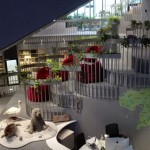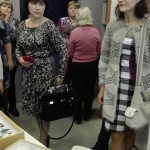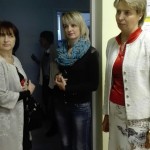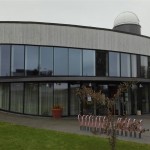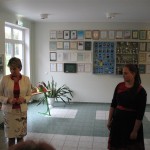Rēzekne municipality's mathematics and informatics teacher experience exchange trip to Pärnu District

In the middle of the autumn, mathematics and informatics teachers went through an exchange of experience to the Aloja municipality and the training institutions of the Estonian Pärnu county of Estonia.
At Staiceles High School, we met with the longest children's songs. This school is the school of the Aloya municipality, which has already been directly affected by optimisation and the 10 th class of secondary school was not opened this year. However, the situation has been unexpectedly resolved: the premises are rented for vocational secondary school purposes and this means that the school is filled with youth fire and energy, teachers have the opportunity to further work in these classes. The Staiceles teachers offered to attend 3 hours: an integrated mathematics and English-language hour-long school, mathematics and informatics hours where we got different ideas. The work of the team of small town specialists was amazed.
Next, our way led to Häädemeeste High School, where we had lunch and met the new school directors. She shared the impressions of her first work and told her about the most topical school. In the next primary school, guests from Latvia were given the opportunity to look into a robotic group and were introduced to the realization of the subject of “multimedia”. In Estonia, primary education already consists of mandatory training content (approximately 90 %) and a selection part. This does not mean that the choice is made by pupils, but the school can make its own special offer by introducing subjects (career education, multimedia etc.), which are rare in our schools. In a particularly attractive form, a school self-government is active in the Surju School, the name of which is “public school”. In the framework of self-government, the head of the school is the President of the State, but a real election campaign and elections are held annually (based on the real elections in Estonia), in which the Cabinet of Ministers is elected. On 24 February, in celebrating the day of Latvia's public proclamation, the presidential election is taking place in accordance with the label and the procedure.
On the second day, mathematics and informatics teachers visited the new and very modern environmental education centre “Pernova”, which can also be called a competency centre, as educational programmes are being developed and school pupils of each of the Pärnu county schools have the opportunity to learn biology, chemistry, natural sciences, astronomy, geography in modern-day laboratories, planetary, observatories, etc. In the environmental education centre, we also met with the specialists of the educational administration. She talked about a collaboration model created over 3 years, which serves as a basis for competency education and which we are talking about in Latvia. We went to two schools in Pairnava: the primary school and the Cottage State School. The specialists of these schools shared their experience as a means of using digital learning methods in every subject of learning and in an interesting way to organise the participation of all teachers in experience and training, introducing DIGIintercept once a week and DIGIh once a month in schools.
Nautrēnu High School's long-term mathematics teacher Inara Gleizde acknowledged: “I think we saw something valuable in every school.” The primary school of Surju particularly liked their patriotism and the interesting idea of self-administration. I want to involve my primary school pupils in the use of head bills through e-environment. '
“Every institution visited was interested in its special offers through educational programmes. The aim of the Estonian School education programme is to: learn wherever we are! Interestingly, in the Pärnu county schools, every teacher must teach THE necessary skills in a computer class for his study subject, so that a schedule is drawn up and the computer class is busy all day.
I had a particularly topical look at the robotic lessons of the Surrey School and the elementary school. In Estonia, many schools teach robotics: with the help of Lego or VEX constructors, programming skills are learned. Seeing what enthusiasm students are working on in robotic activities, it is the intention to buy constructors for their school and to offer students a robotics in educational activities ”, taking part in a reflection OF Gaigalavas primary school informatics teacher Ineta.
In turn, Maltas secondary school mathematics teachers L. Kļaviņa - Lozda and I. Kurme emphasise that experience gained during the exchange of experience:
- in the open mathematics hour in the 9 th grade of the Staicele primary school, where the pedagogue shared the experience of preparation for the final test work (the “Quadratic function” theme);
- knowledge of multimedia activities;
- watching robotic lessons for children of primary school.
The teacher acknowledges that it was interesting and useful:
- excursion through the main school of Staiceles, thus gaining ideas for the creation of cabinets and recreational corners, the installation of glass windows at the door of the classes,
- enjoy the concert of music school students (especially the talented cluster of piano, class 3 pupils, performances),
- visit the Pairnava Environmental Education Center where students have the opportunity to leave the usual learning environment and learn outside the classroom,
- a picture of THE use OF IT in the learning process in Estonian schools,
- get acquainted with Pairnava's old-town guide.
In his school, teacher L. Kļavina - Lozda would like to introduce:
- lessons in which students can develop high-speed computing skills using programmes in e-environment (in Estonia, students also participate in high-speed Olympics);
- active intermoments (in elementary school every day after the 3 rd lesson 15 minutes of pupils have an opportunity to move, dance, learn dance steps; the big screen, light, dic music) is used.
Returning home, teachers expressed their wish that it was necessary to plan the next exchange of experience. It has been acknowledged that such exchanges of experience are undeniably enriching and expanding the vision of teachers to the learning process and give new ideas to the progressive realisation.
The journey description and opinions were summarised:
Elita Opincane, educational administration specialist
